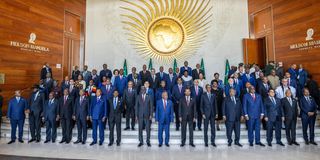Prime
Deny Israel observer status, activists ask African Union

The opening ceremony of the African Heads of State and Government in Addis Ababa, Ethiopia, on February 17, 2024.
A group of civil society organisations have asked the African Union (AU) to reject Israel’s application for observer status at the African Union, reviving a two-year debate that remains unresolved.
And ahead of the African Union Summit in Addis Ababa on Saturday, some 151 organisations and individuals from within the continent and representing the African diaspora say denying Observer Status to Israel will send a message that atrocities can be punished even by the weak. They call themselves a coalition of Pan-African civil society organisations.
The argument is about a two-year application Israel made to the African Union but the context is about Israel’s war against Hamas in Gaza, which the activists argue has allowed Israel to mete out brutality on civilians who have no links to Hamas.
In a letter dated February 13, they asked African Union Chairperson Azali Assoumani to stand firm and protect Palestinian civilians who have borne the biggest brunt of the war.
Mr Assoumani is the President of the Comoros and will chair this Summit before handing over to Mauritania’s Mohamed Ould Cheikh Ghazouani.
The activists, including ten from Kenya, want the African Union to “refuse the application for Observer Status by the state of Israel” which was brought before the Assembly in 2022.
“We believe that such an action would send a strong and unified signal to the State of Israel that their actions are intolerable and that they must desist in continuing down this path,” they wrote.
They argue that Israel must agree to a sustained ceasefire followed by negotiations as a better way to end the occupation in Gaza and the West Bank.
They also asked the African Union to “convene an extra-ordinary Summit of member states to deliberate on the impact that conflicts on the continent and in the Middle East are having on Africa and the upholding of international law and norms.”
The letters include Kenya’s activists such as:
• Kenyan human rights activist Daniel Muoti
• Kayole Community Justice Centre
• Tribeless Youth
• UKOO CBO
• VOCAL Africa
• Wahenga Youth Group
• Kenyans for Tax Justice Social Movement
• The Catholic Justice and Peace Department
• Haki Yetu
• Young Women's Leadership Institute.
Although the African Union Agenda for this Summit hasn’t specifically indicated there will be deliberations on Israel’s observer application, the continent also includes some of its staunch critics such as Algeria and South Africa.
Last month, South Africa sued Israel at the International Court of Justice, accusing Israel of committing acts of genocide. The Court ruled on January 26 that Israel must prevent further actions that lead to genocide, even as the actual case is determined. South Africa has since reported to the Court that Israel hasn’t observed the order yet.
But African countries are also divided on the Gaza war. Some like Kenya argued that the ICJ isn’t an appropriate arena to resolve the case. They argue that dialogue and diplomacy should be adopted more.
Israel, unlike Palestine, isn’t an observer in the African Union. In 2022, it applied and was initially granted diplomatic status but the Assembly of Heads of State and Government deferred the debate to allow consensus.
It never came. In the meantime, African Union Commission Chairperson Moussa Faki initially accused member states of hypocrisy, arguing most countries in Africa support relations with Israel. At the time in February 2022, 46 of 55 member states had diplomatic relations with Israel.
“What is this logic that allows a Member State to enjoy the recognition of a State at home and to refuse it to the organisation, whose overwhelming majority recognises this State?” Faki argued then.
Is the said State [acceptable] at the national level while it cannot be [accepted] at the African level? Frankly, I would like someone to explain this kind of double standard to me.”
Since the war in Gaza, Algeria, Chad (where Faki comes from) and South Africa have suspended those ties by recalling their ambassadors. And Faki has become one of the most vocal Africans against the Israeli crackdown in Gaza, and the West Bank.
At the corresponding Summit last year in February, the Assembly of Heads of State and Government steered clear of Israel's observer status but it renewed “our call for the launch of a credible political process to end the Israeli occupation and to dismantle the system of apartheid on the territory of the State of Palestine to achieve a just, comprehensive and lasting peace.”
A communique issued later said the AU supports “the renewal of the State of Palestine's request for full membership in the United Nations, and urge all member states to support this request aimed at holding the Israeli occupation accountable for war crimes and crimes against humanity committed and continues to commit against the Palestinian people.”
Observer status means a country or organisation can participate and gain access to some meetings at the AU, enabling it to lobby for a more positive resolution. However, the said country can’t vote on any decisions.





